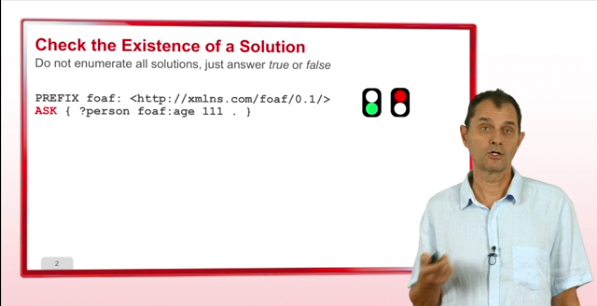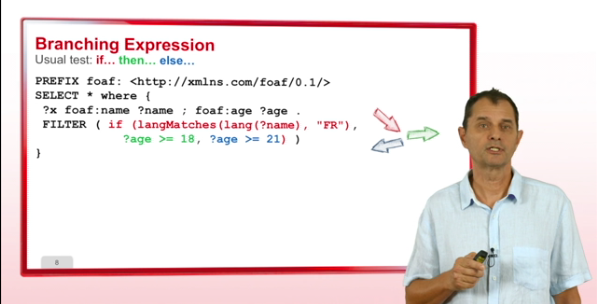3. SPARQL Query Language

Descriptif
This third part presents the SPARQL (pronounced sparkle) Query Language that enables users to query RDF triple stores.
Table of Contents
1. RDF Graph Pattern Matching
2. Statements
3. Filter, Constraint and Function
4. Pre and Post Processing
5. Several Query Forms
6. Results and Update Demos on SPARQL
Demos on SPARQL
Vidéos
Demos about SPARQL
Flint, a SPARQL Query Editor Editors are now available for SPARQL. We present the Flint structured editor which provides syntactic coloration. The editor proposes SPARQL keywords according to the
6. Results and Update
In the last part, we will see the result format and Update query. The format of SPARQL query results are also standardized by the
5. Several Query Forms
In the fifth part, we will see several query forms. Until now, we have seen the select where SPARQL query form but there are
4. Pre and Post Processing
In the fourth part, we will see the pre and post processing of a SPARQL query. An RDF dataset is composed of a default graph
3.Filter, Constraint and Function
In the third part, we will see the filters, constraints and functions. It is possible to filter the results of query using
2. Statements
This video présents the SPARQL Statements. The first statement is the optional pattern. It enables to specify a part of a graph pattern that is
1. RDF Graph Pattern Matching
This third part presents the SPARQL (pronounced sparkle) Query Language that enables users to query RDF triple stores. The SPARQL query language enables us to access data
Intervenants et intervenantes
Auteur d'une thèse en Informatique à Nice en 1988
Professeure en poste à Université Côte d'Azur (en 2022)
Maîtresse de conférences en poste à l'Université de Nice-Sophia Antipolis (en 2020)
Autrice d'une thèse en sciences appliquées soutenue à Paris 6 en 1997
Professeur des Universités Université de Côte d'Azur
Rapporteure lors d'une thèse soutenue à l'INSA Lyon en 2024
Présidente du jury d'une thèse en Informatique à Université Côte d'Azur en 2024
Chercheur à l'INRIA de Sophia-Antipolis, FR (en 2016). Directeur de recherche à l'INRIA Sophia Antipolis-Méditerranée, Université Côte d'Azur (en 2021)
Titulaire d'un doctorat en sciences (Informatique, Nice, 2002)











